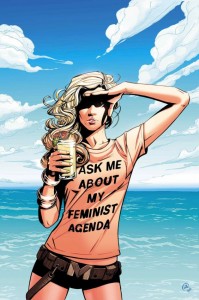 Oh, boy, is it time to talk about THAT topic now? Whee, Ryan Lit is going to become Person #514392 to write a blog post about Marvel’s diversity issues! It’s content like this that makes you guys want to keep coming back to my blog, isn’t it? Seriously though, with Marvel’s soft reboot set to launch after “Secret Empire”, which is likely going to see the cancellation of several series and the retooling of the entire way the company’s comic division functions, there’s really no better time to talk about this so that I can throw my own two cents into this overflowing wishing well. For the two of you who don’t know what I’m talking about, for the last few years Marvel Comics have decided to get… Uncomfortably political. It started off in small ways, ways that I honestly wouldn’t even classify as “political” if they’re being looked at out of context – dark-skinned Spider-Man, Muslim Pakistani-American Ms. Marvel, jabs at Donald Trump, not really anything to get mad at, quite the opposite. But when Marvel saw that these things sold, suddenly every comic needed to have SOME sort of agenda to it, even when it made no sense. Thor (replaced by a woman now, who is also called Thor) has joined Captain Marvel in beating up people who disagree with feminism, Bor (Thor’s grandfather) has unsolicited opinions on Israel and is apparently part of the Men’s Rights Activists, Mockingbird is complaining about a patriarchal conspiracy to keep women out of SHIELD, and every single character you know and love is dead or evil, replaced by a younger, colored counterpart.
Oh, boy, is it time to talk about THAT topic now? Whee, Ryan Lit is going to become Person #514392 to write a blog post about Marvel’s diversity issues! It’s content like this that makes you guys want to keep coming back to my blog, isn’t it? Seriously though, with Marvel’s soft reboot set to launch after “Secret Empire”, which is likely going to see the cancellation of several series and the retooling of the entire way the company’s comic division functions, there’s really no better time to talk about this so that I can throw my own two cents into this overflowing wishing well. For the two of you who don’t know what I’m talking about, for the last few years Marvel Comics have decided to get… Uncomfortably political. It started off in small ways, ways that I honestly wouldn’t even classify as “political” if they’re being looked at out of context – dark-skinned Spider-Man, Muslim Pakistani-American Ms. Marvel, jabs at Donald Trump, not really anything to get mad at, quite the opposite. But when Marvel saw that these things sold, suddenly every comic needed to have SOME sort of agenda to it, even when it made no sense. Thor (replaced by a woman now, who is also called Thor) has joined Captain Marvel in beating up people who disagree with feminism, Bor (Thor’s grandfather) has unsolicited opinions on Israel and is apparently part of the Men’s Rights Activists, Mockingbird is complaining about a patriarchal conspiracy to keep women out of SHIELD, and every single character you know and love is dead or evil, replaced by a younger, colored counterpart.
It, uh… Obviously didn’t work out. In the entirety of 2016, Marvel only had 33 comic books in the top 100 best-selling comics of the year, which sounds pretty good until you realize that their direct competitor, DC, had almost double that number, at 63. This disparity is completely inexcusable, especially considering the fact that while DC has been seriously struggling in other media (the last DC movie we got that was truly good was 2008’s “The Dark Knight”), Marvel has been knocking it out of the park again and again, with the biggest movie franchise of all time bearing their name. The Avengers, Spider-Man, the X-Men and the Guardians of the Galaxy are each a juggernaut of a franchise, with millions of devoted fans lining up to buy movie tickets on opening night. Each fan of the Marvel Cinematic Universe is a potential comic book reader just waiting to be snatched up, so why has Marvel completely failed to do that? Well, according to David Gabriel, the vice president of sales, it’s because the comics are just too damn diverse. And the thing is that there’s certainly a correlation here – Marvel’s sales did, in fact, start to go down the moment they began pushing for diversity and the alt-left agenda. So on the surface level that statement makes sense, but it’s very important to keep in mind that correlation doesn’t always equal causation. And the fact of the matter is that it’s not diversity that killed Marvel’s sales, it’s how that diversity was implemented.
The thing about us, as human beings, is that we don’t really like having things forced down on us, especially in our escapism/entertainment. When I sit down to read a comic book, the last thing I want to see is a character essentially turning to the ‘camera’ and going on a political tirade which is little more than a soapbox for the writer’s own opinions. Don’t get me wrong, some stories not only benefit from political allegories – they downright require them. If you remove the politics from “Watchmen” or “Maus”, or even early “X-Men”, what’s left? But notice how those stories are merely allegories, or otherwise keep their politics in the background. At no point does Wolverine turn around and say “Hey, bub, you see how people discriminate against mutants? That’s happenin’ to gay folks and black folks and all the others that are different all around. And if ya vote for the Republican party, it’s just gon’ keep on going”. He doesn’t really need to shove his agenda down my throat because I’m smart enough to understand the allegory and draw my own conclusions. Modern comic books don’t have the same level of subtlety. “Allegory” and “metaphor” seem to be just fancy, yet meaningless words to the folks at Marvel. Gone are the days in which Wonder Woman and her island of Amazons represented feminism and female empowerment, now characters like Mockingbird are straight up wearing “Ask me about my feminist agenda” T-shirts. And if you, for one reason or another, dislike feminism and prefer to identify as an egalitarian instead, well, too bad. These books are overtly about feminism and you just have to deal with that.
And then there’s the matter of characters being consistently replaced, which once again calls back to the idea of people disliking things being shoved down their throats. When we got our black Spider-Man and Middle-Eastern Ms. Marvel, nobody particularly cared because the originals were still around. If you kept an open mind, you could give these new characters a shot, but if you didn’t like them you could always just go back to their “traditional” counterparts. But when Wolverine died, he got two replacements, and neither of them is the classic character that people want to read about. Same deal when Tony Stark was placed in a coma – two replacements, but neither of them comes close to scratching that Iron Man itch you might have after watching the movies. Hulk, Thor, Captain America, they’ve all been gone, and none have received a “proper” series since. All we have are their politically correct replacements. Okay, but what if I don’t want to read about Asian Hulk? I’ve got no choice but to wait until Bruce Banner comes back to life… Which is what many people appear to be doing, considering the fact that “Totally Awesome Hulk” has been selling rather poorly.
The fact of the matter is that it’s not diversity killing Marvel, nor is it politics. It’s how these things are implemented. Saying “You’re going to read about feminism and you’re gonna like it, because if you don’t you’re a terrible human being” isn’t exactly going to convince a whole lot of readers to pick up your book, you know. Similarly, as G. Willow Wilson (creator of Ms. Marvel) put it, “launching a legacy character by killing off or humiliating the original character sets the legacy character up for failure.” The lesson that Marvel needs to do isn’t “Hey, maybe we shouldn’t include politics or diverse characters in our books”. It’s “Hey, if we’re going to include politics we should do it in a smart way, and if we’re going to include diverse characters we shouldn’t do it at the expense of our classic, beloved heroes, who are now enjoying a resurgence of popularity because of the movies”. Hopefully the upcoming reboot will address these issues without the company’s stance shifting to the opposite direction. Because let me tell you, if Marvel STOP being political and introducing diverse characters into their stories, you’re going to see an even angrier blog post from me.


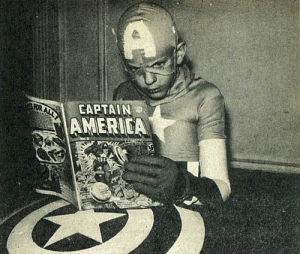 Superheroes are EVERYWHERE these days, and I do mean that. Captain America, Iron Man, Batman and Superman dominate the box office, The Flash runs across TV screens everywhere, Spider-Man and his web-slinging friends show up on school bags, T-shirts, notepads and lunch boxes (do kids even use lunchboxes these days? I’ve never actually seen one in my life), hell, images of Ms. Marvel were even used to
Superheroes are EVERYWHERE these days, and I do mean that. Captain America, Iron Man, Batman and Superman dominate the box office, The Flash runs across TV screens everywhere, Spider-Man and his web-slinging friends show up on school bags, T-shirts, notepads and lunch boxes (do kids even use lunchboxes these days? I’ve never actually seen one in my life), hell, images of Ms. Marvel were even used to  And once again, the
And once again, the  Happy Halloween, everybody! You didn’t think I’d let you guys go without a proper Halloween special now, did you? Wipe that notion out of your brain, because there’s absolutely no way someone who loves horror as much as I do could possibly skip a holiday that’s literally all about scary stuff! But what was I supposed to talk about? Everybody’s talking about their favorite horror movies, or the scariest costumes online, or listing scary Creepypastas online (which typically tend to be your standard fare that everyone knows like “Jeff the Killer” or “Squidward’s Suicide” anyway) or whatever, and I didn’t quite know what to talk about that would be original. Sure, I can also make a list of my scariest games ever, but it’s going to be inevitably filled up by “Silent Hill”, “Resident Evil”, “Fatal Frame” and the other horror classics that are prominent on every single list. So then I thought… Why not talk about 2D horror games? Why not explore these games which don’t need a third dimension in order to scare the living daylights out of you? And thus, here we are! Keep in mind, I had a lot of games to pick from, and just because I went with these three choices doesn’t mean the other candidates I had are unworthy of your attention. Who knows, maybe I’ll make a part 2 of this list next year around Halloween! Anyway, for now, let’s go on with the show!
Happy Halloween, everybody! You didn’t think I’d let you guys go without a proper Halloween special now, did you? Wipe that notion out of your brain, because there’s absolutely no way someone who loves horror as much as I do could possibly skip a holiday that’s literally all about scary stuff! But what was I supposed to talk about? Everybody’s talking about their favorite horror movies, or the scariest costumes online, or listing scary Creepypastas online (which typically tend to be your standard fare that everyone knows like “Jeff the Killer” or “Squidward’s Suicide” anyway) or whatever, and I didn’t quite know what to talk about that would be original. Sure, I can also make a list of my scariest games ever, but it’s going to be inevitably filled up by “Silent Hill”, “Resident Evil”, “Fatal Frame” and the other horror classics that are prominent on every single list. So then I thought… Why not talk about 2D horror games? Why not explore these games which don’t need a third dimension in order to scare the living daylights out of you? And thus, here we are! Keep in mind, I had a lot of games to pick from, and just because I went with these three choices doesn’t mean the other candidates I had are unworthy of your attention. Who knows, maybe I’ll make a part 2 of this list next year around Halloween! Anyway, for now, let’s go on with the show!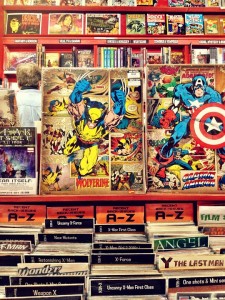 Thanks to the Marvel Cinematic Universe and DC’s extremely poor attempts at copying it, comic book properties have never been more successful! Ten years ago, nobody but hardcore comic book nerds knew Iron Man’s real name, or Harley Quinn’s origin, or even the simple fact that Thor is a Marvel superhero and not just a Norse god. Today, we’re all familiar with Tony Stark’s eccentric antics in and out of his suit, we all know about the abusive relationship between the artist formerly known as Dr. Harleen Quinzel and her puddin’, and many of us ponder what would happen if a baby tried to lift Mjolnir. But how many of us have actually sat down and read a comic book featuring any of those characters? Despite the fact that only his three solo movies – not counting all the other movies he’s appeared in or had starring roles in – made over $2.5 billion dollars at the box office, the latest issue of Iron Man’s solo comic book series that I could find any sales information about, “Invincible Iron Man #11”,
Thanks to the Marvel Cinematic Universe and DC’s extremely poor attempts at copying it, comic book properties have never been more successful! Ten years ago, nobody but hardcore comic book nerds knew Iron Man’s real name, or Harley Quinn’s origin, or even the simple fact that Thor is a Marvel superhero and not just a Norse god. Today, we’re all familiar with Tony Stark’s eccentric antics in and out of his suit, we all know about the abusive relationship between the artist formerly known as Dr. Harleen Quinzel and her puddin’, and many of us ponder what would happen if a baby tried to lift Mjolnir. But how many of us have actually sat down and read a comic book featuring any of those characters? Despite the fact that only his three solo movies – not counting all the other movies he’s appeared in or had starring roles in – made over $2.5 billion dollars at the box office, the latest issue of Iron Man’s solo comic book series that I could find any sales information about, “Invincible Iron Man #11”, 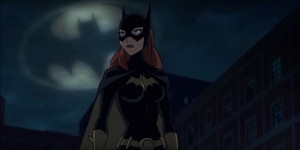 “The Killing Joke” is a classic Batman story written by one of comics’ most influential authors, the one and only Alan Moore (who has also penned “Watchmen” and “V for Vendetta”, among many, many more). It defined the Batman mythos for YEARS to come, giving the Joker a more-or-less definitive origin and transforming the failing-in-popularity Batgirl into the much more popular Oracle. The original graphic novel, albeit a bit on the short side, keeps being printed and reprinted to this day, with fans still debating over its ambiguous ending. Was the Joker right? Can one really bad day truly drive a person insane? Was that person Batman, who finally snapped and killed his arch-nemesis (echoing the sentiment he had expressed earlier in the story about their struggle ending by one of them killing the other), or did he listen to Gordon and bring him in by the book? Argh, I could go on and on about this story, but I don’t need to – countless others, from regular fans all the way to comic book writer Grant Morrison have thrown their own two cents into it. No, right now, I want to focus on a little something else.
“The Killing Joke” is a classic Batman story written by one of comics’ most influential authors, the one and only Alan Moore (who has also penned “Watchmen” and “V for Vendetta”, among many, many more). It defined the Batman mythos for YEARS to come, giving the Joker a more-or-less definitive origin and transforming the failing-in-popularity Batgirl into the much more popular Oracle. The original graphic novel, albeit a bit on the short side, keeps being printed and reprinted to this day, with fans still debating over its ambiguous ending. Was the Joker right? Can one really bad day truly drive a person insane? Was that person Batman, who finally snapped and killed his arch-nemesis (echoing the sentiment he had expressed earlier in the story about their struggle ending by one of them killing the other), or did he listen to Gordon and bring him in by the book? Argh, I could go on and on about this story, but I don’t need to – countless others, from regular fans all the way to comic book writer Grant Morrison have thrown their own two cents into it. No, right now, I want to focus on a little something else. 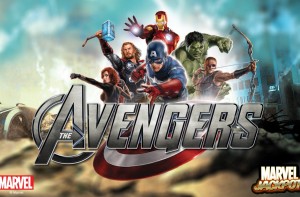 Okay, okay, fine, I know – I’ve spoken about the Avengers
Okay, okay, fine, I know – I’ve spoken about the Avengers  2016 was supposed to be the year of videogame adaptations. Finally, after years and years and years of failures dating all the way back to 1993 with the release of the utterly atrocious “Super Mario Bros.” movie, directors, producers and studios have attempted to bring beloved videogame properties to life on the big screen, with no luck. Even the best videogame movies, such as “Mortal Kombat”, are still only considered good by videogame movie standards and fail when measured up to literally anything else. This year, things were meant to change, damn it! We were going to have “Warcraft”, “Ratchet & Clank”, “Assassin’s Creed”, “Angry Birds”, and they were all going to be good! Well, okay, maybe not that last one, but things were looking up! As it turns out, no, they’re not – “Ratchet & Clank” was critically panned, proving once and for all that a fun game does not necessarily make a good movie, and according to early reviews
2016 was supposed to be the year of videogame adaptations. Finally, after years and years and years of failures dating all the way back to 1993 with the release of the utterly atrocious “Super Mario Bros.” movie, directors, producers and studios have attempted to bring beloved videogame properties to life on the big screen, with no luck. Even the best videogame movies, such as “Mortal Kombat”, are still only considered good by videogame movie standards and fail when measured up to literally anything else. This year, things were meant to change, damn it! We were going to have “Warcraft”, “Ratchet & Clank”, “Assassin’s Creed”, “Angry Birds”, and they were all going to be good! Well, okay, maybe not that last one, but things were looking up! As it turns out, no, they’re not – “Ratchet & Clank” was critically panned, proving once and for all that a fun game does not necessarily make a good movie, and according to early reviews 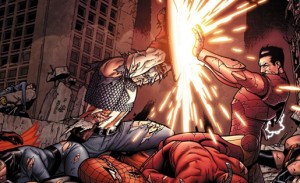 Marvel’s 2006 event comic event “Civil War” was one of the company’s biggest ones, scoping across the entire Marvel universe. Pretty much every single Marvel hero who was alive and on Earth at the time was involved in one way or another, whether in the main books or in their own spinoff series. At the time, “Civil War” received universal critical acclaim for completely shattering and reshaping the Marvel universe and presenting a fresh new perspective on the hero vs hero conflict (remember – up until that point, the classic formula of hero vs hero fights involved only fighting for a bit before teaming up against a bad guy, and there was no bad guy in sight during “Civil War”). While fan opinion on the story is more mixed these days (and with good reason – some of the content within is pretty questionable), the fact that its 2016 movie adaptation
Marvel’s 2006 event comic event “Civil War” was one of the company’s biggest ones, scoping across the entire Marvel universe. Pretty much every single Marvel hero who was alive and on Earth at the time was involved in one way or another, whether in the main books or in their own spinoff series. At the time, “Civil War” received universal critical acclaim for completely shattering and reshaping the Marvel universe and presenting a fresh new perspective on the hero vs hero conflict (remember – up until that point, the classic formula of hero vs hero fights involved only fighting for a bit before teaming up against a bad guy, and there was no bad guy in sight during “Civil War”). While fan opinion on the story is more mixed these days (and with good reason – some of the content within is pretty questionable), the fact that its 2016 movie adaptation  Today, gaming technology is at its peak. Games like “The Last of Us” bring us Hollywood-worthy story and performances, technologies like the Oculus Rift and the HTC Vive bridge the gap between the virtual world and our own and mobile platforms allow us to bring our games with us literally wherever we go without needing to worry about taking anything other than the essential items we carry every day. With the gaming industry being by far the most successful financially, overshadowing the movie and music industries, it’s pretty clear that we’re living in a golden age of gaming no matter how you look at it. Games have never been more immersive, more groundbreaking, more… Well, good. Or have they?
Today, gaming technology is at its peak. Games like “The Last of Us” bring us Hollywood-worthy story and performances, technologies like the Oculus Rift and the HTC Vive bridge the gap between the virtual world and our own and mobile platforms allow us to bring our games with us literally wherever we go without needing to worry about taking anything other than the essential items we carry every day. With the gaming industry being by far the most successful financially, overshadowing the movie and music industries, it’s pretty clear that we’re living in a golden age of gaming no matter how you look at it. Games have never been more immersive, more groundbreaking, more… Well, good. Or have they?  It’s no secret that I read a lot. Like, a TON. I don’t always read a lot, true, but my average is 3-4 books a week. That’s about a book every 2 days, which is a lot more than most people read. I’ve received two questions regarding that fact – one of them is how I’m able to read so much, and the other is where I find all those hundreds of books to read. Well, the answer to the first question is obvious – I just pick up a book and I read it, simple as that. I don’t bother with any speed reading techniques or anything of this sort. Naturally, I read between 400 and 500 words per minute, depending on the text, which is a speed that I’m very comfortable with. At that speed, it takes me roughly 6 hours to read a 400-page novel, but again – if the text flows well and the words are relatively simple it can go faster. My “trick”, if you can even call it that, is that I dedicate roughly 2-3 hours per day to reading.
It’s no secret that I read a lot. Like, a TON. I don’t always read a lot, true, but my average is 3-4 books a week. That’s about a book every 2 days, which is a lot more than most people read. I’ve received two questions regarding that fact – one of them is how I’m able to read so much, and the other is where I find all those hundreds of books to read. Well, the answer to the first question is obvious – I just pick up a book and I read it, simple as that. I don’t bother with any speed reading techniques or anything of this sort. Naturally, I read between 400 and 500 words per minute, depending on the text, which is a speed that I’m very comfortable with. At that speed, it takes me roughly 6 hours to read a 400-page novel, but again – if the text flows well and the words are relatively simple it can go faster. My “trick”, if you can even call it that, is that I dedicate roughly 2-3 hours per day to reading. Many believe that videogames are only for men. After all, the classic Hollywood stereotype of the gamer is a socially awkward teenage guy, right? No one but teenage guys and grown-up teenage guys could possibly enjoy a game! Well, as it turns out,
Many believe that videogames are only for men. After all, the classic Hollywood stereotype of the gamer is a socially awkward teenage guy, right? No one but teenage guys and grown-up teenage guys could possibly enjoy a game! Well, as it turns out, 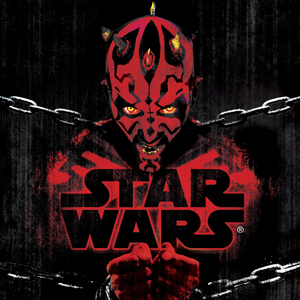 I’ve been reading “Star Wars” novels for a veeeeery long time. Admittedly, most were by Timothy Zahn, and admittedly, some were better than others, but at the end, all of them, the good and the bad, have done nothing but increase my love for the “Star Wars” universe. I read about the trials Luke Skywalker had to go through in order to rebuild his Jedi Academy, about his unlikely marriage to Mara Jade and about the attack of the Yuuzhan Vong. True, I also read some ridiculous stuff such as how the Emperor transferred his consciousness into a clone body and seduced Luke to the dark side or something (I don’t know, I generally try to keep the bad stories to the back of my mind), but hey, nothing good is good all the time. Even today, I continue reading “Star Wars” books with joy.
I’ve been reading “Star Wars” novels for a veeeeery long time. Admittedly, most were by Timothy Zahn, and admittedly, some were better than others, but at the end, all of them, the good and the bad, have done nothing but increase my love for the “Star Wars” universe. I read about the trials Luke Skywalker had to go through in order to rebuild his Jedi Academy, about his unlikely marriage to Mara Jade and about the attack of the Yuuzhan Vong. True, I also read some ridiculous stuff such as how the Emperor transferred his consciousness into a clone body and seduced Luke to the dark side or something (I don’t know, I generally try to keep the bad stories to the back of my mind), but hey, nothing good is good all the time. Even today, I continue reading “Star Wars” books with joy.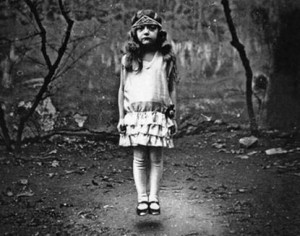 “Miss Peregrine’s Home for Peculiar Children” is one of the most fun, well-paced, tightly written novels I’ve read in recent years! The narrative flows seamlessly, to the point where I had trouble believing that the book was actually almost 400 pages long (I could’ve sworn it was only about 200 when I finished). I won’t tell you too much about the plot, as the author goes to great lengths to establish his setting, so even giving you a synopsis of what goes on will be spoiling things. Instead, let me just say that the premise of the book is the author basically asking himself “What would happen if I took a whole bunch of old, black and white photographs that seem strange and peculiar to us and then try to explain them?” And those photos are all included within the book, making them one of its best parts. Whenever the characters are discussing looking at some pictures, you can view the actual pictures with them, all of which (minus a couple of letters and illustrations) have been discovered by the author and are authentic, mostly depicting children who seemingly display extraordinary abilities. And, fair warning, a lot of those pictures are
“Miss Peregrine’s Home for Peculiar Children” is one of the most fun, well-paced, tightly written novels I’ve read in recent years! The narrative flows seamlessly, to the point where I had trouble believing that the book was actually almost 400 pages long (I could’ve sworn it was only about 200 when I finished). I won’t tell you too much about the plot, as the author goes to great lengths to establish his setting, so even giving you a synopsis of what goes on will be spoiling things. Instead, let me just say that the premise of the book is the author basically asking himself “What would happen if I took a whole bunch of old, black and white photographs that seem strange and peculiar to us and then try to explain them?” And those photos are all included within the book, making them one of its best parts. Whenever the characters are discussing looking at some pictures, you can view the actual pictures with them, all of which (minus a couple of letters and illustrations) have been discovered by the author and are authentic, mostly depicting children who seemingly display extraordinary abilities. And, fair warning, a lot of those pictures are